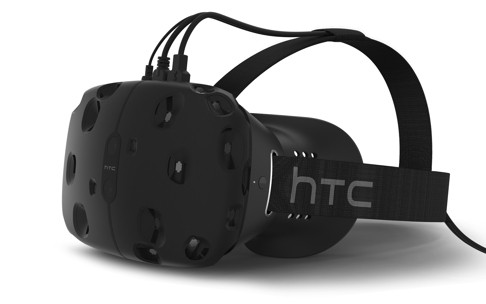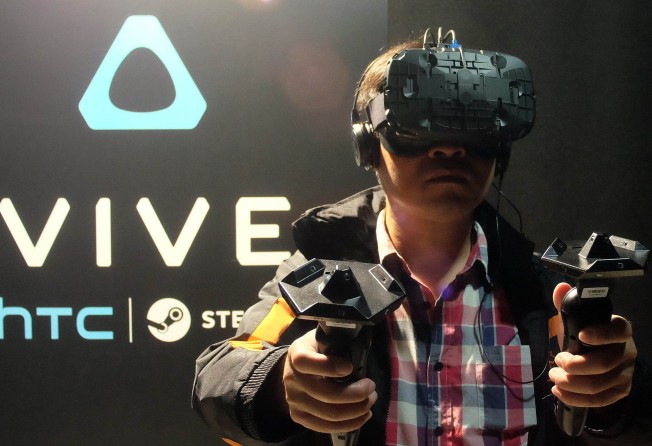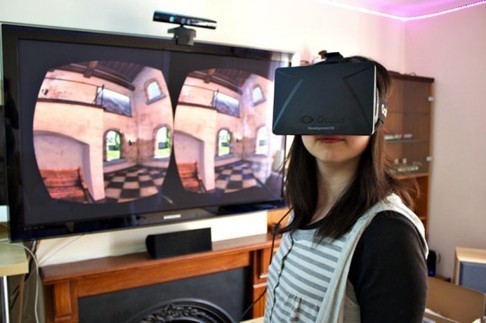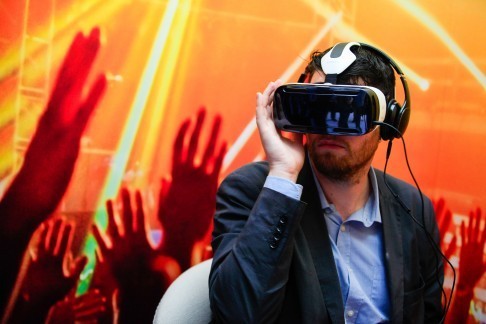
HTC unveils Vive Pre virtual reality headset for developers at CES 2016 ahead of consumer edition launch of device in April

Taiwan-based smartphone vendor HTC has unveiled a special edition of its Vive virtual reality headset for developers at the Consumer Electronics Show in Las Vegas, which officially opens to the public early Thursday (China time), as it bets big on virtual reality technology finally taking off in 2016.
Called Vive Pre, the device is essentially a preview of the April launch of a consumer version of Vive, which HTC hopes will set shoppers’ hearts aflutter to offset its ailing fortunes in China’s overheated smartphone market.
The company has seen dwindling profits and declining sales figures in recent years, and is pivoting to become an early investor in virtual reality headsets to effect a turnaround.
It has invested millions of US dollars in developing Vive and has spent generously to invest in start-ups like virtual reality platform WEVR.
The Vive Pre was created in partnership with video game company Valve Corporation and is an upgrade of the original HTC Vive virtual reality device.
The consumer edition was originally slated for a late 2015 release but was delayed after HTC had a “very big technological breakthrough” with its camera system, according to HTC chief executive Cher Wang.
The game hasn’t even started yet for [virtual reality]. There’s still a lot of stuff to be worked out, from content to technology and usage models
The Vive Pre camera comes with a safety feature that displays objects in users’ physical environment within the broader virtual reality display. This helps to reduce the risk of people colliding with desks or chairs while walking around with a not-so-clunky box strapped to their face.
Other updates include a smaller headset, ergonomic improvements to the handheld controllers, a redesigned strap that makes for more comfortable wearing and a brighter, clearer display.
“The headset has brighter, crisper screens with Mura correction, which makes objects feel like they’re right in front of you,” said Dan O’Brien, vice president of planning and product management for HTC Vive.
All the improvements found on the Vive Pre will be available on the Vive consumer edition headset, said HTC.
No exact release date has yet been announced but the company said last year the Vive will have a “slightly higher price point”. In other words, it’s not going to be as cheap as Samsung’s Gear (US$99) but is likely to be closer to the new Oculus Rift headset (about 10 times as much), for which pre-orders begin online this Wednesday.
Should the Vive become available as planned in April, it would rank among the first high-end virtual reality headsets on the market.
To build up a related ecosystem, HTC has teamed up with PC maker Hewlett Packard to create a US$1,700, 2-terabyte, virtual reality-centric gaming computer fitted with Intel i7 K-series processors. It is due out January 16.
But HTC’s early bet on virtual reality does not guarantee its success in a market that is still in the early stages, said Bryan Ma, vice president of client devices research at market research firm IDC.
“The game hasn’t even started yet for [virtual reality]. There’s still a lot of stuff to be worked out, from content to technology and usage models,” said Ma, adding that it will take five to 10 years before the tech goes mainstream.
“Some of the higher-end [devices] require a US$1,500 PC to go with them, and because of that going mainstream is going to take some time,” he said.
“Even if HTC is making a long-term bet, virtual reality can take a lot of different forms,” Ma said.
The Oculus Rift, considered one of Vive’s biggest rivals, is on the cusp of going on sale. Oculus is offering it for pre-order in 20 countries from this week. Analysts expect it to retail for a cool US$1,500, including a compatible PC.

